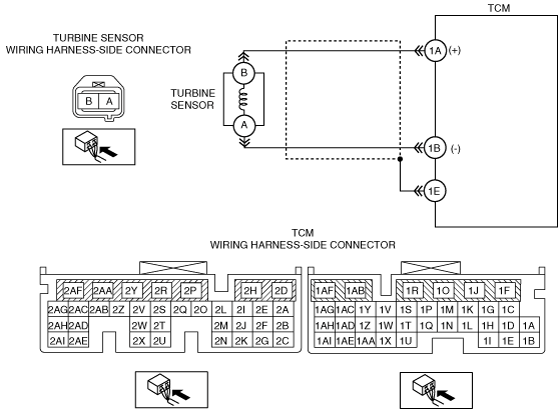|
1
|
RECORD VEHICLE STATUS WHEN DTC WAS DETECTED TO UTILIZE WITH REPEATABILITY VERIFICATION
-
Note
-
• Recording can be facilitated using the screen capture of the PC function.
• Record the freeze frame data/snap shot data.
|
—
|
Go to the next step.
|
|
2
|
VERIFY RELATED SERVICE INFORMATION AVAILABILITY
• Verify related Service Information availability.
• Is any related Service Information available?
|
Yes
|
Perform repair or diagnosis according to the available Service Information.
• If the vehicle is not repaired, go to the next step.
|
|
No
|
Go to the next step.
|
|
3
|
INSPECT TCM CONNECTOR FOR POOR CONNECTION
• Switch the ignition off.
• Disconnect the TCM connector.
• Inspect for poor connection at TCM terminals 1A and 1B (such as damaged/pulled-out pins, corrosion).
• Are terminals normal?
|
Yes
|
Go to the next step.
|
|
No
|
Repair or replace the connector and/or terminal, then go to Step 10.
|
|
4
|
INSPECT CONTINUITY OF TURBINE SENSOR CIRCUIT
• Inspect for continuity between the TCM terminals 1A and 1B (wiring harness-side).
• Is there continuity?
|
Yes
|
Go to the next step.
|
|
No
|
Go to Step 7.
|
|
5
|
INSPECT TURBINE SENSOR SIGNAL CIRCUIT FOR SHORT TO GROUND
• Inspect for continuity between the TCM terminals (wiring harness-side) and body ground.
-
― Terminal 1A and body ground
― Terminal 1B and body ground
• Is there continuity?
|
Yes
|
Refer to the wiring diagram and verify whether or not there is a common connector between the following terminals:
• Turbine sensor terminal B—TCM terminal 1A
• Turbine sensor terminal A—TCM terminal 1B
If there is a common connector:
• Determine the malfunctioning part by inspecting the common connector and the terminal for corrosion, damage, or pin disconnection, and the common wiring harness for a short to ground.
• Repair or replace the malfunctioning part.
If there is no common connector:
• Repair or replace the wiring harness which has a short to ground.
Go to Step 10.
|
|
No
|
Go to the next step.
|
|
6
|
INSPECT TURBINE SENSOR CIRCUIT FOR SHORT TO POWER SUPPLY
• Switch the ignition ON (engine off).
• Measure the voltage at TCM (wiring harness-side) terminals 1A and 1B.
• Is there 0 V at the TCM wiring harness-side connector terminals?
|
Yes
|
Go to the next step.
|
|
No
|
Refer to the wiring diagram and verify whether or not there is a common connector between the following terminals:
• Turbine sensor terminal B—TCM terminal 1A
• Turbine sensor terminal A—TCM terminal 1B
If there is a common connector:
• Determine the malfunctioning part by inspecting the common connector and the terminal for corrosion, damage, or pin disconnection, and the common wiring harness for a short to power supply.
• Repair or replace the malfunctioning part.
If there is no common connector:
• Repair or replace the wiring harness which has a short to power supply.
Go to Step 10.
|
|
7
|
INSPECT TERMINAL TURBINE SENSOR FOR POOR CONNECTION
• Switch the ignition off.
• Disconnect the turbine sensor connector.
• Inspect for poor connection at turbine sensor terminals A and B (such as damaged/pulled-out pins, corrosion).
• Are terminals normal?
|
Yes
|
Go to the next step.
|
|
No
|
Repair or replace the connector and/or terminal, then go to Step 10.
|
|
8
|
INSPECT TURBINE SENSOR
• Inspect the turbine sensor.
• Is the turbine sensor normal?
|
Yes
|
Go to the next step.
|
|
No
|
Replace the turbine sensor, then go to Step 10.
|
|
9
|
INSPECT TURBINE SENSOR CIRCUIT FOR OPEN CIRCUIT
• Inspect for continuity between turbine sensor terminals (wiring harness-side) and TCM terminals (wiring harness-side).
-
― Terminal B and terminal 1A
― Terminal A and terminal 1B
• Is there continuity?
|
Yes
|
Go to the next step.
|
|
No
|
Refer to the wiring diagram and verify whether or not there is a common connector between the following terminals:
• Turbine sensor terminal B—TCM terminal 1A
• Turbine sensor terminal A—TCM terminal 1B
If there is a common connector:
• Determine the malfunctioning part by inspecting the common connector and the terminal for corrosion, damage, or pin disconnection, and the common wiring harness for an open circuit.
• Repair or replace the malfunctioning part.
If there is no common connector:
• Repair or replace the wiring harness which has an open circuit.
Go to the next step.
|
|
10
|
VERIFY SAME DTC IS NOT PRESENT
• Always reconnect all disconnected connectors.
• Clear the DTC using the M-MDS.
• Perform the following procedure to ensure that the DTC has been resolved:
-
1. Start the engine.
2. Warm-up the engine and transmission.
3. Drive the vehicle in D position and make sure that the gears shift smoothly from 1GR to 6GR.
• Perform the DTC inspection using the M-MDS.
• Is the same DTC present?
|
Yes
|
Replace the TCM, then go to the next step.
|
|
No
|
Go to the next step.
|
|
11
|
VERIFY DTC TROUBLESHOOTING COMPLETED
• Clear the DTC using the M-MDS.
• Perform the DTC inspection using the M-MDS.
• Are any DTCs present?
|
Yes
|
Go to the applicable DTC inspection.
|
|
No
|
DTC troubleshooting completed.
|
